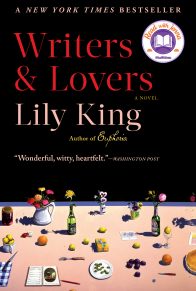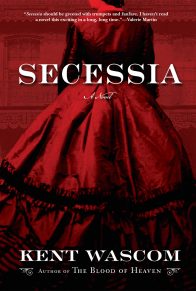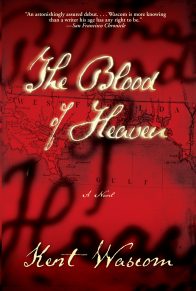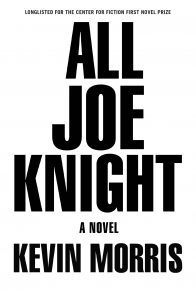Praise for The New Inheritors:
Named a Best Book of the Year by the Washington Independent Review of Books and LitReactor
An Okra Pick for Summer 2018
“One of the darkest, most compelling writerly imaginations around.”—New Orleans Advocate
“The New Inheritors is the third mesmerizing historical novel by Kent Wascom . . . His style and subjects echo great Southern writers like William Faulkner and Harry Crews, continuing a tradition of recounting terrible things in deliriously beautiful language.”—Tampa Bay Times
“Wascom is a careful student of history, and his portraits of America are riven with many of its seamier episodes . . . The beauty and richness of his observations and detail when he dives deep made me long for more . . . Wascom makes an art of illuminating the many ways that America’s history belies the vaunted ideals on which it was founded.”—Washington Independent Review of Books
“Both far-reaching in scope, but intimate in drama, The New Inheritors, through the trials of an artist and an heiress, wrestling demons of all proportions, is a gorgeous, powerful exploration of how the land and our own difficult natures define us as Americans.”—LitReactor
“Wascom delivers a lyrical, emotionally charged study of life along the Gulf Coast a century past . . . The tragedy that closes Kemper and Isaac’s life together comes as a swiftly onrushing surprise, as does a galloping conclusion that follows a much more languorously unfolding narrative, one that takes in wayward women, country preachers, orphanages, steaming ports, and a thousand well-observed period details. The best moments of this very good book are those in which Wascom writes with sententious but not sentimental poetry . . . Family drama and love story, Wascom’s latest is evidence of an evolving talent. Look for more.”—Kirkus Reviews
“Wascom’s latest literary saga is his strongest yet . . . Whether describing the Gulf Coast’s lush vegetation or acts of sudden brutality, Wascom’s writing burns with a raw, elemental power. The story encompasses the era’s white privilege and anti-immigrant stances, letting readers make the contemporary connections, while pondering what it means to be American.”—Booklist
“Wascom’s satisfying third novel set on the Gulf Coast (following The Blood of Heaven and Secessia) explores the intricate details that can populate a family’s history . . . Wascom’s writing is often melodic . . . [and] the novel is a winning blend of history and family dynamics.”—Publishers Weekly
“The New Inheritors is about the building, and curdling of love . . . A lonely meditation on how humans come together and inevitably fall apart, whether through the simple passage of time or their own hubris . . . A novel where violence and beauty butt up against each other in fascinating ways.”—Shelf Awareness
“With The New Inheritors, Kent Wascom has blown the genre of historical fiction wide open. Fueled by an entirely new level of narrative ambition and scope, this third installment in his Gulf Coast Quartet intertwines the decay at the heart of a family, American imperialism, and the dark legacy of the South. Yet, it is the beauty and fury of the region itself–an epic natural history transcending humanity–that takes center stage. As dreamlike and visceral as a memory, this is a novel you will not soon forget.” —Keaton Patterson, Brazos Bookstore
“Kent Wascom’s The New Inheritors is his third novel about the Woolsack family, and it is undeniably his most captivating. Set in vivid, lush locations like the Mississippi Gulf Coast, New Orleans, and Nicaragua, the novel draws you in with Wascom’s beautifully written imagery and keeps you there with a story of love, loss, revenge, and redemption. Beginning at the turn of the 20th century, the novel focuses on Isaac, an orphaned artist, and Kemper, a fiercely independent heiress who find themselves ripped apart as World War I begins. Even more threatening than the war in Europe, however, is Kemper’s dark family secrets, ones that her brothers are determined to put to rest in potentially deadly and dangerous ways. Though this is the third book Wascom has penned about the Woolsack family, it stands entirely on its own—a great book to get lost in this summer!”—Morgan McComb, Raven Bookstore
“Unfurling one fine sentence after another, The New Inheritors is like some magnificent dream ship from the past set to churn the waves of the present, bound for blood and beauty, and for the breaking of heads and hearts.”—Laird Hunt, author of Neverhome
“The landscape, grand and melancholy, comes alive in Kent Wascom’s The New Inheritors, shaping the characters and the history of the Gulf in illuminating ways, showing readers how much place and history can tell us about who we are.”—Chantel Acevedo, author of The Distant Marvels and The Living Infinite
Praise for Secessia:
A Publishers Weekly Book of the Week
A Houston Chronicle Summer Pick
“[A] vivid portrait of 1862 New Orleans . . . Smoke is still rising off Kent Wascom’s spectacular debut, The Blood of Heaven (2013), but this young author is already roaring back with a sequel . . . With his rust-tooth style and flare for brutality, Wascom is one of the most exhilarating historical novelists in the country . . . This is a Gothic tale of revolution broken, rebels crippled, passions smothered but not extinguished . . . Wascom, who was born in New Orleans, has justly been compared to Cormac McCarthy, but the spirit of his new novel is touched by the lurid energy of Anne Rice and Joyce Carol Oates and even Edgar Allen Poe.”—Ron Charles, Washington Post
“Five characters share what happened when New Orleans fell to Union troops in 1862, bringing the largest city in the Confederacy under the control of brutal general Benjamin ‘The Beast’ Butler.”—Entertainment Weekly (Summer Book Preview)
“Wascom’s second novel takes place in beguiling, fetid, and unruly New Orleans in the year 1862, as the city is overtaken by Union troops. . . . Though most of the characters are as passionate, selfish, and greedy as the city itself, Wascom makes every one of them a pleasure to read, effortlessly inhabiting each of their specific psychologies . . . This is such a good yarn that readers will be totally on board with the whole rambunctious package.”—Publishers Weekly (starred review)
“The stunning opening scene sets the pace for this fascinating saga . . . The narrative achieves an exquisite counterbalance of five shifting points of view . . . Wascom has hit his stride with this deftly descriptive historical treasure. The plot illuminates little-known areas of history and culture . . . Highly recommended for historical fiction readers.”—Library Journal (starred review)
“No town is as atmospheric as New Orleans—none except for Kent Wascom’s New Orleans, that is, which is so real you smell the perfume of ladies, the crimes of men, the swamps of culture. Secessia is a history lesson, a bouquet of fine pleasures, writing as rich as the South, a dazzling cavalcade of colorful, deep, and often deeply troubled characters coming together at the moment the city’s grand history stopped and its destiny was set in motion.”—Bill Roorbach, author of The Remedy for Love and Life Among Giants
“While some writers approach history with patience and respect, Kent Wascom prefers to take it by storm. His vivid characters, male and female, young and old, powerful and passionate, brawling and bleeding, leap from the page with such energy that one does not so much look back at them as make way for them. This is the undead past clawing down the present with a force only a novelist of unfettered imagination and great joy in life could set free among us. Kent Wascom has been likened to Faulkner and McCarthy, and his fire-breathing, idiosyncratic style stands up to that comparison. Secessia should be greeted with trumpets and fanfare. I haven’t read a novel this exciting in a long, long time.”—Valerie Martin, author of The Ghost of the Mary Celeste and Property
“So much historical fiction seems posed—almost as if it must bend to fit the genre—but the writing here feels more like a necessity. Secessia reads like an outpouring of fascination and love for the past . . . solidifies Kent Wascom’s unique place in the literary landscape.”—River City Reading
“One of the hot new names in American fiction is Kent Wascom, a 27-year-old Louisiana native fascinated with the tangled history and dark psyche of the Deep South . . . Beginning with his 2013 debut, The Blood of Heaven, Wascom has used that brutal flair and a lush prose style to begin what will likely be a decades-long project of demythologizing chunks of 19th-century American history . . . Secessia gives Wascom, who was born in New Orleans, a chance to examine some deep-seated Southern obsessions—with race, white privilege, and an addiction to lost causes and bankrupt symbols—that are still playing out today.”—AL.com
“Passions and intrigue run high, while fascinating characters attempt to pick their way through the volatile landscape.”—MLive.com (Books for the upcoming holiday season)
Praise for The Blood of Heaven:
Shortlisted for the David J. Langum Sr. Prize in American Historical Fiction
Longlisted for the Flaherty-Dunnan Award for First Fiction
One of Publishers Weekly’s Best Summer Books of 2013
A Spirit Summer Reading Pick
“When you read as many contemporary novels as I do, it’s easy to get jaundiced, because we’re awash in hype, and almost nothing ever seems quite as good as it’s cracked up to be. So please know that I’m not just giving this young author a pass. I truly can count on the fingers of one hand the number of first novels that have ever excited me this much. Wascom made me think at times of Cormac McCarthy, Charles Frazier and William Gay, but his vision is very much his own, as is his extraordinary voice. He’s left himself a hard act to follow. This book is pure gold.”—Steve Yarbrough
“The young Master Wascom arrives at our gates wielding a narrative broadsword, speaking in a monstrous voice, a Louisiana visionary in command of an army of bones and by God he comes to conquer. It’s been more than a decade since the literary world has seen such a portentous debut from a novelist prodigy, equal parts savage and savant, and what else is there to say but All hail the future—this boy king has fifty more years of writing to feed our hungry souls.”
—Bob Shacochis
“Young Kent Wascom went down to the crossroads and there he made his deal. Or maybe he was just born spirited for this kind of work. Either way, I cannot name such a stunning debut as this one. It reads as not written, but lived and remembered—and how impossible is that? Whoever may own Kent Wascom’s soul, The Blood of Heaven will forever be ours.”—Robert Olmstead
“The Blood of Heaven is a brilliant comic rant that, with its twisted religious fervor, holds on to the reader and does not let go. Kent Wascom takes a nugget of colonial history—the Aaron Burr Conspiracy—and imbues it with a fiery life. His is a singular, important, and utterly vital voice.”—Sabina Murray
“In the present age of cultural strife and national re-definition, a brilliantly resonant novel blooming from America’s ever-thus history is just what the zeitgeist deserves. And The Blood of Heaven is as achingly beautiful in its personal story as it is savagely clear-headed in its national story. Kent Wascom has arrived fully-formed as a very important American writer.”—Robert Olen Butler
“Oh America, heart-broken and constantly fought over! The Blood of Heaven is a dark hymn to the ruthless and ruinous early days in the Louisiana fringes of our republic. In the tradition of As I Lay Dying and Flannery O’Connor and Blood Meridian, idiomatic and far off into transgression, this one, from Kent Wascom, bless his genius, is the real deal.”—William Kittredge
“Wascom is a craftsman, and each of his lengthy, winding sentences shimmers with the tang of blood and bone and sweat, and the archaic splendor of his language.”—Boston Globe
“Rendered in lurid, swamp-fever prose swollen with biblical imagery (Burr first appears in the book on horseback, ‘hailed like Christ Himself’), the South of Mr. Wascom’s imagination is an inferno of plague, vice and slave trafficking. . . . It’s that dizzying pace, especially as Angel sets off on a Tarantino-esque rampage of revenge killings, that makes the book so compelling. Mr. Wascom’s writing rolls from the page in torrents, like the sermon of a revivalist preacher in the grip of inspiration. You can’t help listening, no matter how wicked the message.”—Wall Street Journal
“Though he’s not yet 30, Mr. Wascom has the gift, the elusive “it” that tells you on the first page that here is someone worth reading . . . In its best moments, and there are many, you will slip completely into Wascom’s fictional world . . . You will also be in the presence of a young writer whose talent is obvious, whose sense of narrative is classical and clear, whose understanding of the craft is deep and well-formed and will only get better.”—New York Journal of Books
“[Blood of Heaven] entertains with its energetic language and fast-paced action, and the love story between Angel and his wife is moving in its you-and-me-against-the-world naïveté. Wascom’s research is put to good use as the gargantuan forces of history squash Angel and his associates.”—New York Times Book Review
“The work of a young writer with tremendous ambition, a bildungsroman of religion and revolution set during an obscure chapter of American history . . . [Wascom] creates a first-person narrator who speaks with fire-breathing eloquence, tormented by God and the Devil and equally conversant with both . . . Wascom writes with a fire-breathing, impassioned eloquence. Angel’s voice compels our trust from the beginning and echoes all the ghosts of the dark Southern past.”—Washington Post
“If you thought the Wild West was wild, wait until you read about West Florida. In Kent Wascom’s stunning debut novel that territory serves as microcosm of a nation’s dark and violent infancy . . . With its setting, its violence-driven plot and its resonant and often harshly beautiful language, The Blood of Heaven evokes comparison to the work of Cormac McCarthy. Its mordant humor and its exploration of slavery and violence as the tragic flaws at the heart of American history—as well as its awareness of what hellish danger awaits those who are sure God is on their side—recall such writers as William Faulkner, Flannery O’Connor and Mark Twain. Angel is a terrifying and irresistible narrator, and Kent Wascom is a striking new voice in American fiction.”—Miami Herald
“Wascom’s West Florida makes the Old West look like a Disney resort in comparison, and his protagonist is a fitting emissary for this harsh and unforgiving land . . . Whether describing a tender moment between husband and wife or a brutal revenge killing, there’s no question of Wascom’s range . . . There is plenty here to applaud in this grim portrait of a dysfunctional frontier family caught up in a forgotten American war.”—NPR Books
“Kent Wascom, a 26-year-old Louisiana native, has produced an astonishingly assured debut . . . He is more knowing than a writer his age has any right to be and displays a virtuosic command of biblical cadence and anachronistic vernacular without striking any false notes.”—San Francisco Chronicle
“Wascom’s setting fascinates, while the veneer of violence makes us eager spectators in this narrative of American conquest and survival . . . Ultimately, Wascom skirts around Faulkner’s Mississippi, O’Connor’s Georgia, and McCarthy’s divided interests of Tennessee and Texas to firmly plant his stake in America’s Deep South. It is a wise move. In Blood of Heaven, Wascom paints a fuller portrait of the American South. Though he makes strong overtures to these Southern writers and their territory, Wascom makes it his own.”—Washington Independent Review of Books
“Kent Wascom has written a rollicking historical thriller, a juicy love story, religious symbolism, a tale of woe, adventure, lust, manhood, money-chasing, nationhood, and religious and racial bigotry in early 1800s America. . . . Early American history was raw and gritty, and Wascom deals in that hard-boiled reality, but it’s balanced by a polished and eloquent prose style that has a certain Old Testament quality to it, which gives the tale its unique flavor and gravity. . . . Wascom engages America’s original sin with real force and seriousness; indeed, there are brutal passages that detail this incredible evil as the real-life horror show it was, and truly show America’s complicity in a moral abhorrence.”—Tallahassee Writers Association
















